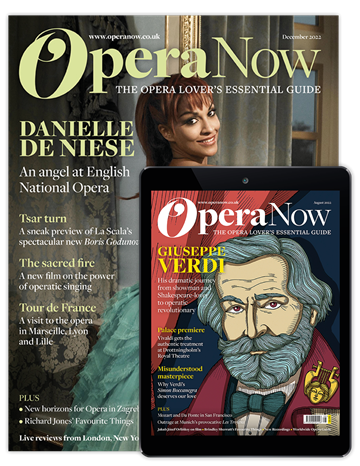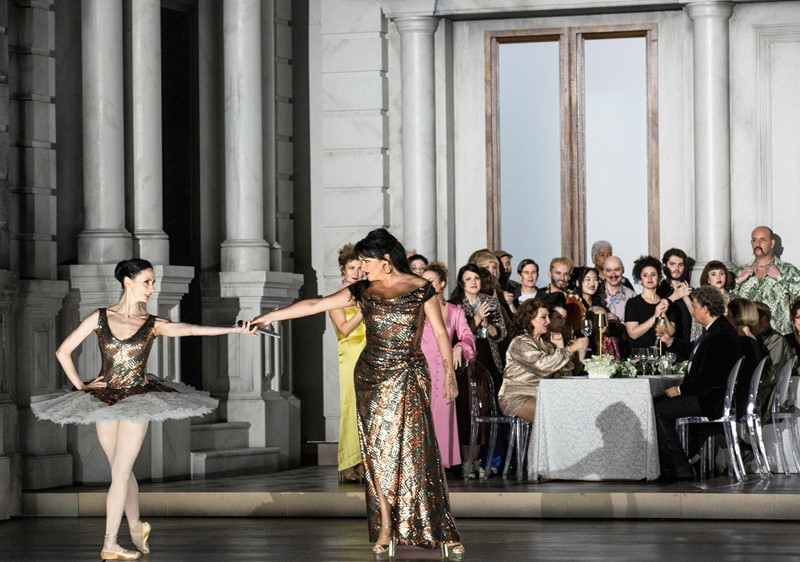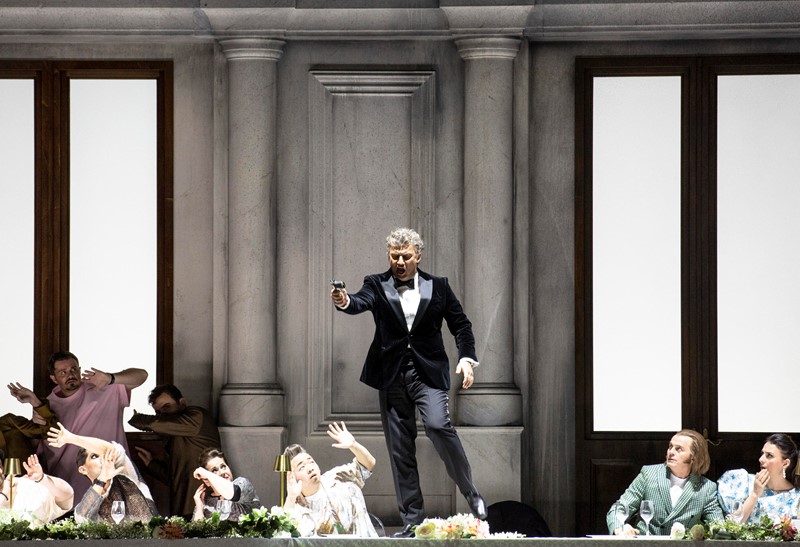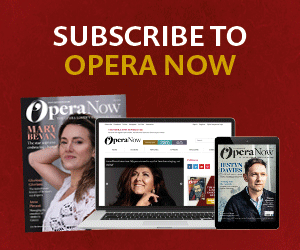Ponchielli: La Gioconda at Salzburg Easter Festival | Live Review
Mark Pullinger
Monday, March 25, 2024
Oliver Mears turns La Gioconda into a tale of abuse at the Salzburg Easter Festival
⭐️⭐️⭐️⭐️


Liudmila Konovalova (Gioconda als Erwachsene), Anna Netrebko (La Gioconda), Chorus of the Accademia Nazionale di Santa Cecilia | Photo credit: Bernd Uhlig
Amilcare Ponchielli’s La Gioconda is an opera it’s easy to scoff at: unlikely coincidences, disguises and fake poisons pile on top of each other at every turn in a tale of lust and vengeance in the middle of which pops up perky ballet The Dance of the Hours, forever associated in the minds of many of us with hippos in tutus in Disney’s animated classic Fantasia.
To his immense credit, Oliver Mears takes it deadly seriously, using the prelude and the ballet music to present a backstory where we learn about an abusive relationship between Gioconda (a ballad singer) and Barnaba (an Inquisition spy). After the death of her father, the girl is prostituted out by her mother (La Cieca – the Blind Woman – turning a metaphorical blind eye). The lascivious Barnaba lures Gioconda with candyfloss and makes her slip on a sparkling golden dress.
At the climax of the ballet – in which the title character takes on three dancer incarnations – diva Anna Netrebko (Gioconda) hands her ballerina double a dagger and urges her to knife her male dance suitors before stabbing Alvise, another patriarchal figure, in solidarity with his wronged wife, Laura, whose heads then appears upon a silver platter at the banquet (a charade: she’s drugged, not dead).
Barnaba – one of the most sinister baddies in all opera – stalks Gioconda, sours her relationship with Enzo, bribes her for sex and kills her mother. But Mears offers a dramatic plot twist; instead of stabbing herself to deny the lustful Barnaba, she turns the dagger on her abuser. This powerful surprise ending tops an excellent production that only has one misfire – a strange scene where Gioconda undergoes electric shock therapy with Barnaba as the doctor. I hope Mears thinks better of it before the production travels to London, for yes, this is a co-production with The Royal Opera (where it’s never been staged) and will arrive, possibly in the 2025-26 season.


Jonas Kaufmann as Enzo Grimaldo | Photo credit: Bernd Uhlig
The other half of the Covent Garden leadership team – Sir Antonio Pappano – conducted the Orchestra dell'Accademia Nazionale di Santa Cecilia in a fiery reading to bring Ponchielli’s brilliant score to life. Until last season, Pappano had been their Music Director for 18 years and their close relationship showed in an account brimming with detail and which really danced when it needed to. His Santa Cecilia Chorus fulfilled their vital role with vigour and style.
But it was largely the A-list cast that the Salzburg glitterati turned out to see and they weren’t disappointed. Anna Netrebko (Gioconda) and Jonas Kaufmann (Enzo) were both making their stage role debuts. It’s five years since I heard Netrebko live (the pre-pandemic Tosca at La Scala) and her soprano has darkened even more in its imperious lower register, making Gioconda’s “Suicidio!” particularly compelling. She can still spin golden top notes and fully entered into the drama. Kaufmann was a shade more tentative, but made for a handsome Enzo, Gioconda’s lover who drops her as soon as old flame Laura reappears in his life. Kaufmann sang “Cielo e mar” ardently, at quite a swift tempo.
Luca Salsi’s dark baritone was perfect for Barnaba, a sort of hybrid between Scarpia and Iago (predating both). “O monumento” is Barnaba’s version of Iago’s Credo (Arrigo Boito was the librettist for both operas) and Salsi injected it with venom. Tariq Nazmi’s bass was too soft-grained for Alvise and he struggled once or twice in the upper stretches of his aria where he resolves to kill his unfaithful wife. Agnieszka Rehlis sang La Cieca with lush tone, while Ève-Maud Hubeaux was terrific as Laura, her plum-tinted mezzo as purple as her gown.
Until April 1 | osterfestspiele.at/en








